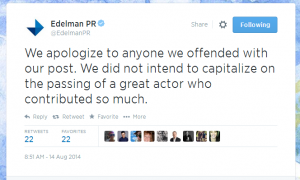Global PR giant, Edelman, has been in the hot seat lately due to a blog post that the firm’s Media Relations Strategy EVP, Lisa Kovitz, wrote just 24 hours after Robin Williams’ death. In it, she states that his suicide created a “PR opportunity” for groups advocating for better treatment of mental illness.
The post reads: His death yesterday created a carpe diem moment for mental health professionals and those people who have suffered with depression and want to make a point about the condition and the system that treats it.
It later goes on to read: At Edelman, we are in the business of helping our clients create or join public conversations. We know that appropriate organizations can elevate a public conversation to help those in need. We and our clients can learn from this situation.
Kovitz’s post has clearly left many outraged and baffled about why Edelman, an expert in reputation building, would think to put out such a bold and self-serving message. The majority of respondents criticized that the post was a distasteful PR stunt by Edelman to reinforce its own positioning and that it was simply published too soon after Williams’ death.
But, while the majority of respondents were clearly angered by Kovitz’s blog, a few others felt the criticism went overboard. One less-bothered reader commented:
No apology necessary or needed Edelman. Thank you for your courage to make the post. You saved lives, and that was clearly the intent. This was not a Justin Sacco moment, it was a MADD moment, and we need to force the dialogue you encouraged. Suicide is 100% preventable, just as fear and ignorance are too.
If Kovitz’s intent was to genuinely spark conversations about the issue of depression in our society, as stated in the apology that the firm issued shortly after receiving a barrage of public criticism, where did she go wrong? After a quick glance at her blog post, the answer becomes abundantly clear. This PRSA article does a good job summing it up for us, as well.
- First, all it takes is to read the headline, ‘Carpe Diem,’ to realize her distaste in that somebody’s death or tragedy should never be associated with a ‘Carpe Diem’ or ‘Seize the Day’ moment.
- Kovitz is automatically assuming that Williams’ suicide was due to depression. While it’s probably a fair conclusion, that fact hasn’t necessarily been proven.
- Stating that Edelman is in the business of helping clients create or join public conversations clearly reads like a sales headline and should never be associated with anybody’s death.
- Kovitz states mental health professionals should have spoken up more about depression following the announcement of Williams’ death, as if to insinuate that efforts aren’t already being made in the fight against depression. Perhaps, these professionals were just trying to be sensitive and respect the privacy of Williams’ grieving family just one day after their tragic loss.
Kovitz may have been trying to create a dialogue about the pressing issues of depression. But words of wisdom from one PR professional to another – never connect tragedy to an opportunity, and next time, rethink the promotional plug for your own firm.
What’s your take on Edelman’s blog post? We’d love to hear your thoughts!
